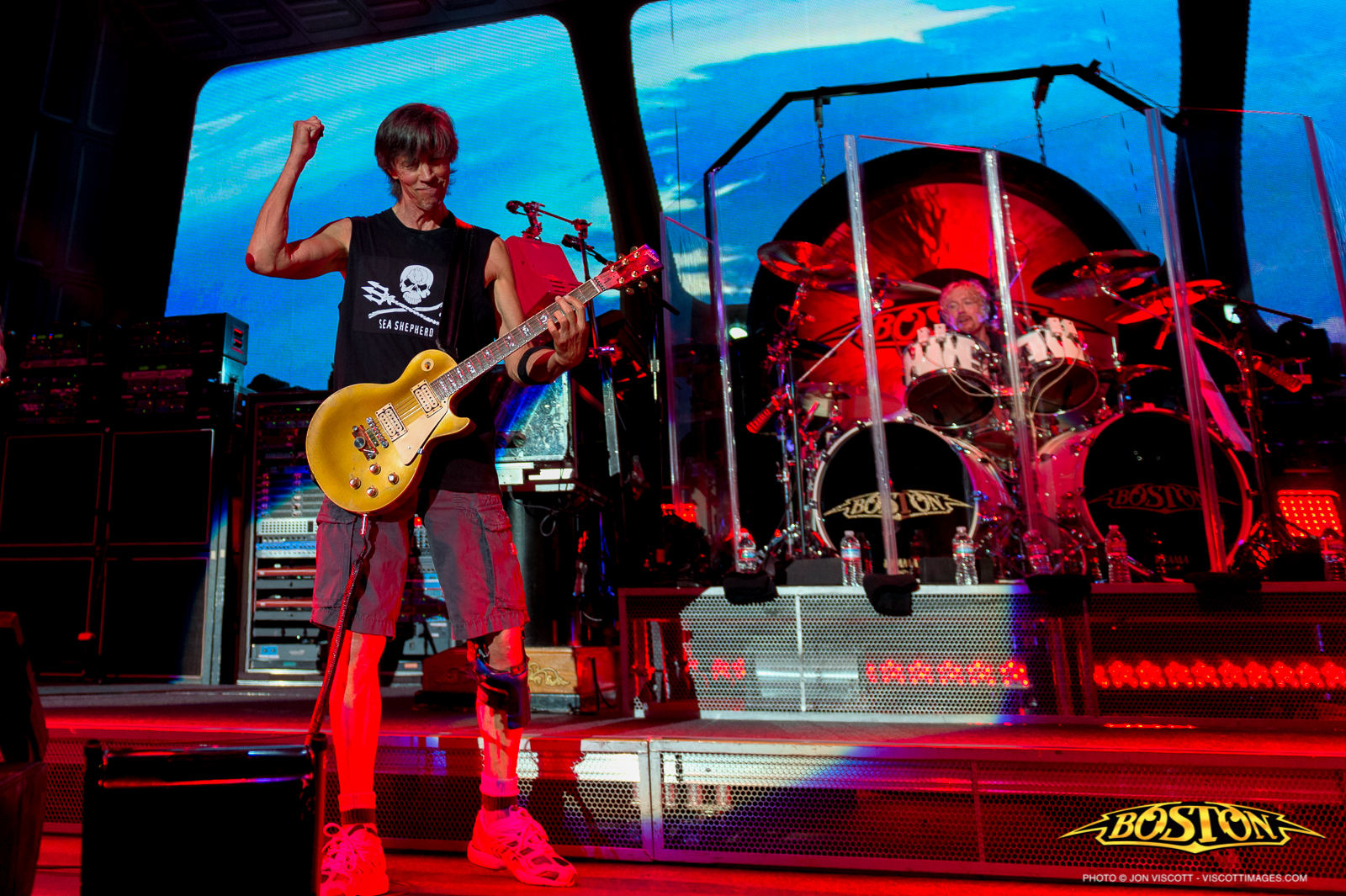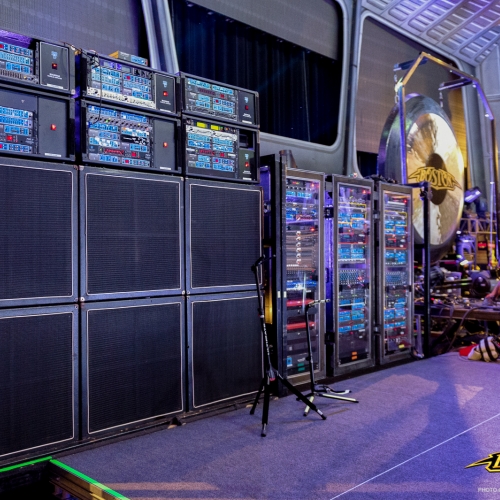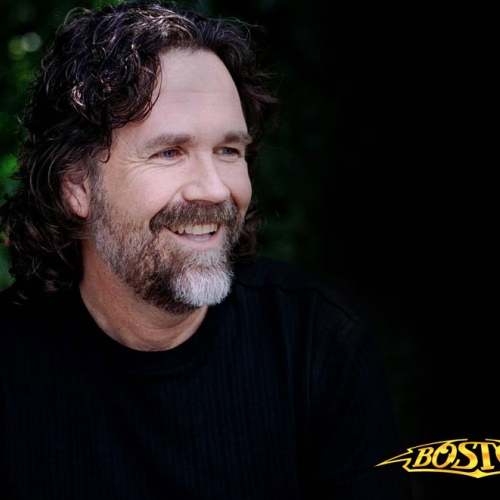Ever wonder how BOSTON got its name or how BOSTON's sound came to be? Here are some answers to those and a lot of other questions about The Origin of Boston:
Although Boston is still active playing and recording today, many listeners associate Boston with the music from their debut album. Ferreting out the origin of those songs, and that sound, explains how the "band" got it's first recording contract in 1976.
Why is "band" in quotes? Because only two people were actually signed by Epic Records to record the album, Tom Scholz and Brad Delp. Scholz and Delp together wrote all of the songs released on the first album, performed 89 percent of the tracks by overdubbing, and Scholz engineered and produced most of it in a studio he built in his basement.
Scholz wrote the first song that would eventually bear the Boston name in 1969 while at MIT. The instrumental, later titled "Foreplay," was also the first piece of music he had ever written.
A year later in 1970 Scholz joined an MIT frat band called "Freehold" where he met guitarist Barry Goudreau and drummer Jim Masdea. The musical connection between Scholz and Masdea triggered Scholz' interest in recording demos. Drawing on his engineering background at Polaroid, he cobbled together a rudimentary tape system, and in 1971 he and Masdea recorded "Foreplay" in Masdea's basement. The pair worked so well together that Masdea went on to record the drums on every demo tape that Scholz shopped.
As Scholz' writing became more prolific, he began using his income from Polaroid to finance demo recordings of his songs in commercial studios in addition to his basement recording.
He began shopping the demos to record companies, only to receive consistently negative, and sometimes insulting rejections. Scholz himself was unhappy with the results of these expensive recording sessions, but they did provide an indispensable ingredient to his future success: he met Brad Delp at one of them.
Delp's voice was the perfect match for Scholz' style, and like Scholz, Delp was a natural at overdubbing to ridiculous extremes. Delp laid down choirs of harmony vocals to compliment Scholz' orchestra of guitars. And of course his super human range didn't hurt.
Delp was a native of Danvers, MA, a Boston suburb, and broke in his performing chops with a local band called the Monks. But it was after Scholz and Delp began working together that Delp began to flourish as a writer, and Delp soon ended up with Scholz in his basement tediously laying tracks for his own material.
In addition to his demo efforts, Scholz performed his original songs with numerous never-heard-from-again local bands, switching off between bass, keys, and guitar, and often with Masdea and Goudreau, sometimes with Delp singing.
In a desperate effort to be heard Scholz started a band in 1973 he called Mo ebony porn ther's Milk, which played all his original material. Digging a little deeper into the bank account he ran display ads in a Boston entertainment rag for their appearances. Included in Scholz' material that the band played were a couple of songs more or less identifiable as precursors to eventual Boston songs, but the real hits were still just a glimmer in the back of Scholz' brain. Only one song appears traceable as an eventual Boston release, "San Francisco Day," which Scholz provided for bands he played in as early as 1970, and was later rewritten by him to become "Hitch a Ride."
Despite Scholz' efforts, Mother's Milk quickly went sour. Disappointed in it's progress, he disbanded the group and later conceded that "Trying to get my music performed live by bar bands was a self defeating experience. It really just distracted me from what I should've been doing all along, writing and recording."
Taking stock, in 1974 Scholz realized his dream of playing music professionally was probably not going to happen. He had spent huge sums of money and time with nothing to show for his efforts. In a last ditch gamble, he emptied the savings account to purchase an obsolete 12 track tape recorder - the rest of the world was upgrading to 24 track - and wired it up to his rudimentary but useable basement studio.

He planned to record the music on six new demos, and then sell his equipment if his music was rejected again. But this time he decided to work alone, except for Masdea. As usual, Scholz relied on him to lay the drum tracks, after which Scholz played all the other instrument tracks by himself, methodically overdubbing one part at a time, and making extensive use of the stereo multiple tracking technique he had perfected. He also utilized several devices he had designed including one called a Power Soak, another he called the Space Echo pedal, and a crude prototype of a chorus unit mounted in a cigar box. At this point he also experimented with unusual processing with equalizers to help achieve his new sound.
Once he had completed music beds for four of his new songs, Scholz looked up Delp and invited him to sing the vocal parts. Delp agreed, and with Scholz as engineer/producer, painstakingly laid down all the lead and harmony vocals, also utilizing extensive multiple tracking.
After mixing the four songs, Scholz sent copies to several labels, and began to prepare himself mentally to liquidate his gear and hang up his guitar.
This time the phone rang. He suddenly had three major labels interested in his songs, and through a fourth, was offered a management deal by a pair of radio promotion men who promised to obtain a recording contract.
The new managers, who called themselves Pure Management, decided to court Epic Records even though Epic A and R had already dismissed Scholz' newest tape, complete with closing insult. Their plan was to put on a live showcase performance for Epic/CBS; just one problem: no band.
To make matters worse the new managers insisted that Masdea be replaced as drummer if they were to obtain a recording deal with anyone. Having signed an agreement with Pure Management that bound them for the immediate future, Delp and also Scholz, who was particularly reluctant, had little choice. He insisted however that Masdea be included in some regard if a record was to be recorded.
Assembling a performing unit capable of reproducing what Scholz had recorded on his demo worried him. He and Delp eventually settled on Goudreau for a second guitar, and Goudreau's friend Fran Sheehan on bass. Scholz was counting on a prototype device he had been working on he called a "doubler" to provide essentially synthetic second tracks for all the guitars and vocals, all of which were religiously "double tracked" in his studio productions.
For drums they initially passed on another friend of Goudreau's, Sib Hashian, and instead settled on a monstrously fast local drummer named David Courier. After several week's preparation, they performed a short set for invited guests from Epic/CBS including the four new songs on Scholz' demo, and some older pieces he had written.
Weeks more passed with no sign of interest from Epic. In the meantime Scholz invited Courier to work on some further music in his basement studio, but with no apparent contract in the offing, and no retainer, Courier declined further involvement with the band. Scholz also believed Courier opted out because the arrangements of his songs gave little latitude for the drum solos that were Courier's passion.
Finally, Scholz decided to finish the last two demos of his six new songs, in hopes it would either tip the scales for Epic, or give him the firepower to look elsewhere, regardless of his managers. One of the songs was "More Than a Feeling." In short order, Epic responded with a contract for Scholz and Delp to record their first album.
Epic insisted that the existing demo cuts be re-recorded in a professional studio, but Scholz knew by this point he could only get his sound by working at his own pace in his own studio. A secret deal with the professional producer, John Boylan, hired by Epic for the job, allowed Scholz to record all the instrument tracks in his basement by himself, and share producer credit with Boylan when the album got released.
To re-record the new songs, Scholz precisely duplicated five of the six existing demo cuts, working mostly by himself in the same studio exactly as he had made the demo recordings, except that Hashian covered the drum parts previously played by Masdea. At Scholz' insistence Masdea sat in to play one song, "Rock 'n' Roll Band," while the sixth cut, "Don't Be Afraid," was held for a follow up album.
Using his basement setup Scholz had Goudreau play the guitar leads for "Longtime," and Sheehan the bass track to "Foreplay." Only one song, Delp's "Let Me Take You Home" - recorded entirely in LA - contained performances of all five of the members pictured on the back of the debut album.
Multitrack tapes were flown to LA where Delp added all the vocals, and Boylan and Scholz mixed the album. Delp had trouble with the LA smog, and had to re-sing at least one song back in Scholz' studio, after which the tracks were laid back in - without ProTools or tape deck synchronizers - and remixed.
Although they were the only performers named on the Epic Records contract, Scholz nixed the idea of calling the act Scholz-Delp or anything of the sort, a decision he must have regretted later when some of the other band members challenged his ownership of the band's name.
According to Scholz, both Boylan and his engineer Warren Dewey suggested "Boston" for the new act for obvious reasons. Although Scholz felt it would be read as copying "Chicago," all of his rock music background had come from Boston. Even as a high school student in Toledo, Ohio he carefully tuned in Boston's WBZ, a high power AM radio station which played the new influx of British rock, and a collection of groups known in the 60's as the "Boston" sound - and of course, he, Delp and the others lived in the greater Boston area. "Boston" it would be.

